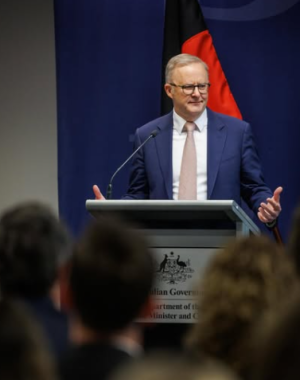Is the Prime Minister really exempt from his own super tax hike? Find out here
By
Maan
- Replies 8
When it comes to major policy changes, fairness is often questioned, especially when those making the rules might be exempt from them.
Recent developments have raised eyebrows about who stands to benefit—and who could be left in the lurch.
Here’s what you need to know about the latest proposal and its potential impact.
Anthony Albanese, Australia's Prime Minister, might be exempt from the very superannuation tax hike he proposed, potentially benefiting when he retires to his $4.3 million clifftop mansion at Copacabana on the NSW Central Coast.
The bill aimed at increasing the tax rate on super contributions for those with balances over $3 million—from 15 per cent to 30 per cent—has raised questions about fairness, with some politicians set to avoid its impact.

The proposed changes were outlined in the Better Targeted Superannuation Concessions and Other Measures Bill 2023.
However, while the plan was set to impact the top 0.5 per cent of super savers, or roughly 80,000 Australians, MPs who were first elected before 2004 were largely unaffected.
This included Albanese, who entered Parliament in 1996 as the member for Grayndler.
The bill was intended to target those in accumulation schemes, where super balances are influenced by fund performance.
MPs elected before October 2004, such as Albanese, were part of a defined benefits scheme, offering guaranteed payouts based on their service duration in Parliament.
This created a loophole where these members could avoid the proposed tax changes.
Shadow treasurer Angus Taylor called the measure ‘unfair,’ arguing it treated different groups differently. ‘This regime proposes a different approach for a farmer or a small business owner, than a public servant, a judge, or a politician,’ Taylor said.
‘Those like the Prime Minister, lucky enough to have a defined benefits scheme, will enjoy deferred payments and rates of tax set entirely by regulation not legislation. This is a wealth tax, plain and simple. But the Prime Minister has exempted himself.’
Other senior MPs, such as Opposition Leader Peter Dutton, Liberal deputy Sussan Ley, and Labor ministers like Catherine King and Penny Wong, may also be unaffected.
They were first elected in 2001, potentially shielding them from the changes. Independent Bob Katter, who entered Parliament in 1993, was also mentioned as potentially exempt.
Treasurer Jim Chalmers indicated that there was little room for compromise with the Greens, who opposed the bill for not going far enough, wanting the $3 million threshold reduced to $1.9 million.
‘The Greens want to vote against fairer taxes on people with millions in super,’ Chalmers said, defending the bill's original intent.
Liberal senator Andrew Bragg raised the exemption issue in May, noting the bill would not apply to Albanese.
‘One of my favourite exemptions in the super tax is the exemption that the Labor ministers have given themselves from the application of a new tax on super,’ he said during Senate discussions.
‘The new tax on super won't apply to Mr O'Connor, it won't apply to Ms King, it won't apply to Senator Wong and it won't apply to the Prime Minister. It is an amazing case of hypocrisy that the Australian people hate about politicians that they are prepared to make rules for everyone except for themselves. It is a disgusting display of hypocrisy, one we should not be surprised about.’
The Coalition highlighted the potential hypocrisy in a dissenting report released in May. ‘This bill, as it stands, will not apply to Mr Albanese himself,’ it said.
The report further explained that MPs elected before 2004, under the old Parliamentary Contribution Superannuation Scheme, were effectively shielded from the changes.
This scheme had been dismantled for new MPs when then-Liberal prime minister John Howard responded to pressure from then-Labor leader Mark Latham.
Under the current arrangement, MPs elected post-2004 are entitled to 15.4 per cent super, above the 11.5 per cent paid to other Australians.
This raised questions about equitable treatment across different classes of workers and public servants, including politicians, judges, and the judiciary.
The bill also proposed taxing self-managed super funds (SMSFs) holding assets above $3 million before they were sold, marking a shift from the usual practice of taxing on realised gains. This move attracted criticism from MPs such as Taylor, who highlighted the absence of indexation for inflation.
‘For everyone else, they face an unindexed annual tax on unrealised capital gains,’ Taylor pointed out. This policy could prove challenging for SMSFs with hard-to-sell assets, like farms.
Teal MP Allegra Spender and independent David Pocock also opposed the unrealised gains tax. Pocock indicated he would block the bill in the Senate due to the tax’s radical nature.
With no other nation applying a similar unrealised gains tax on retirement savings, critics called it an untested, extreme move.
The bill’s future appeared uncertain, with its passage unlikely without compromises with the Greens.
Chalmers remained adamant about sticking to the government's plan, emphasising fairness and the need for those with substantial super balances to contribute more.

With so much debate over who benefits and who doesn’t, it raises an important question: should those in power be subject to the same rules they set for everyone else? Share your thoughts in the comments below.
Recent developments have raised eyebrows about who stands to benefit—and who could be left in the lurch.
Here’s what you need to know about the latest proposal and its potential impact.
Anthony Albanese, Australia's Prime Minister, might be exempt from the very superannuation tax hike he proposed, potentially benefiting when he retires to his $4.3 million clifftop mansion at Copacabana on the NSW Central Coast.
The bill aimed at increasing the tax rate on super contributions for those with balances over $3 million—from 15 per cent to 30 per cent—has raised questions about fairness, with some politicians set to avoid its impact.

Will Anthony Albanese and other politicians escape the super tax hike they proposed? Image source: @albomp on Instagram
The proposed changes were outlined in the Better Targeted Superannuation Concessions and Other Measures Bill 2023.
However, while the plan was set to impact the top 0.5 per cent of super savers, or roughly 80,000 Australians, MPs who were first elected before 2004 were largely unaffected.
This included Albanese, who entered Parliament in 1996 as the member for Grayndler.
The bill was intended to target those in accumulation schemes, where super balances are influenced by fund performance.
MPs elected before October 2004, such as Albanese, were part of a defined benefits scheme, offering guaranteed payouts based on their service duration in Parliament.
This created a loophole where these members could avoid the proposed tax changes.
Shadow treasurer Angus Taylor called the measure ‘unfair,’ arguing it treated different groups differently. ‘This regime proposes a different approach for a farmer or a small business owner, than a public servant, a judge, or a politician,’ Taylor said.
‘Those like the Prime Minister, lucky enough to have a defined benefits scheme, will enjoy deferred payments and rates of tax set entirely by regulation not legislation. This is a wealth tax, plain and simple. But the Prime Minister has exempted himself.’
Other senior MPs, such as Opposition Leader Peter Dutton, Liberal deputy Sussan Ley, and Labor ministers like Catherine King and Penny Wong, may also be unaffected.
They were first elected in 2001, potentially shielding them from the changes. Independent Bob Katter, who entered Parliament in 1993, was also mentioned as potentially exempt.
Treasurer Jim Chalmers indicated that there was little room for compromise with the Greens, who opposed the bill for not going far enough, wanting the $3 million threshold reduced to $1.9 million.
‘The Greens want to vote against fairer taxes on people with millions in super,’ Chalmers said, defending the bill's original intent.
Liberal senator Andrew Bragg raised the exemption issue in May, noting the bill would not apply to Albanese.
‘One of my favourite exemptions in the super tax is the exemption that the Labor ministers have given themselves from the application of a new tax on super,’ he said during Senate discussions.
‘The new tax on super won't apply to Mr O'Connor, it won't apply to Ms King, it won't apply to Senator Wong and it won't apply to the Prime Minister. It is an amazing case of hypocrisy that the Australian people hate about politicians that they are prepared to make rules for everyone except for themselves. It is a disgusting display of hypocrisy, one we should not be surprised about.’
The Coalition highlighted the potential hypocrisy in a dissenting report released in May. ‘This bill, as it stands, will not apply to Mr Albanese himself,’ it said.
The report further explained that MPs elected before 2004, under the old Parliamentary Contribution Superannuation Scheme, were effectively shielded from the changes.
This scheme had been dismantled for new MPs when then-Liberal prime minister John Howard responded to pressure from then-Labor leader Mark Latham.
Under the current arrangement, MPs elected post-2004 are entitled to 15.4 per cent super, above the 11.5 per cent paid to other Australians.
This raised questions about equitable treatment across different classes of workers and public servants, including politicians, judges, and the judiciary.
The bill also proposed taxing self-managed super funds (SMSFs) holding assets above $3 million before they were sold, marking a shift from the usual practice of taxing on realised gains. This move attracted criticism from MPs such as Taylor, who highlighted the absence of indexation for inflation.
‘For everyone else, they face an unindexed annual tax on unrealised capital gains,’ Taylor pointed out. This policy could prove challenging for SMSFs with hard-to-sell assets, like farms.
Teal MP Allegra Spender and independent David Pocock also opposed the unrealised gains tax. Pocock indicated he would block the bill in the Senate due to the tax’s radical nature.
With no other nation applying a similar unrealised gains tax on retirement savings, critics called it an untested, extreme move.
The bill’s future appeared uncertain, with its passage unlikely without compromises with the Greens.
Chalmers remained adamant about sticking to the government's plan, emphasising fairness and the need for those with substantial super balances to contribute more.
Key Takeaways
- A proposed superannuation tax hike aimed at those with balances over $3 million has sparked concerns about fairness and exemptions for certain MPs.
- Politicians elected before 2004, including the Prime Minister, may avoid the new tax due to being part of a defined benefits scheme.
- Critics, including the Coalition, have accused the government of hypocrisy for allowing these exemptions while imposing higher taxes on others.
- The bill's future remains uncertain, with the Greens opposing it for not going far enough and the Senate likely to be a stumbling block.
With so much debate over who benefits and who doesn’t, it raises an important question: should those in power be subject to the same rules they set for everyone else? Share your thoughts in the comments below.







